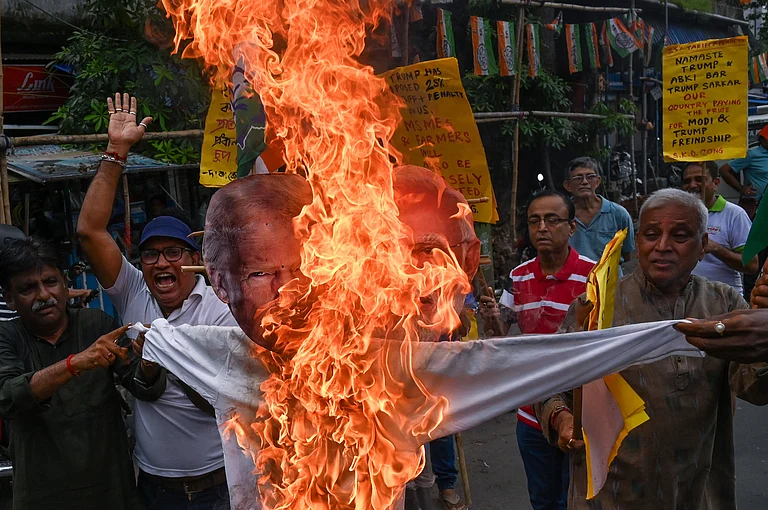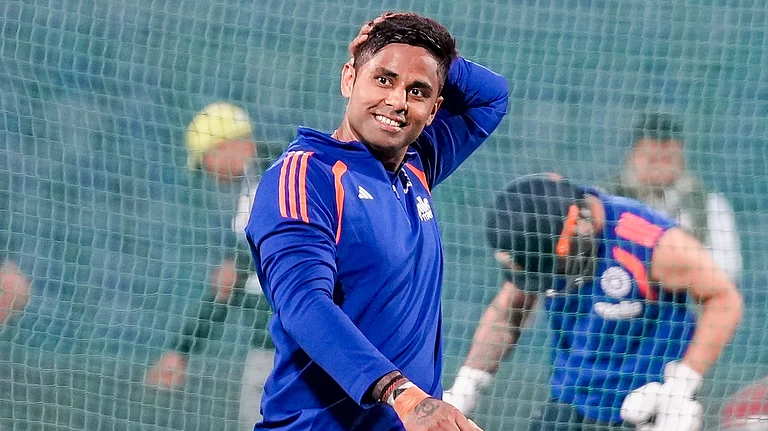In Chattergul, a village in the central part of Kashmir, people leave the house of Amir Hamid, who has been in a coma for the past week in Srinagar's SKIMS hospital, and make their way towards the residence of Gulzar Najar, a policeman who has now fled the area. For the locals as well as for those now pouring in, the village had two families in distress that had to be consoled. The two families, however, lie on two sides of a blurred line demarcating the armed conflict that has marred Kashmiri life for decades.
The fates of the two households became interlocked as a consequence of an escalating cycle of deaths and protests in the Valley. On April 3, Amir, 21, had gone to Kangan on the Srinagar-Ladakh highway, 8 km from his village, Chattergul, to protest in response to the death of another youth the previous day. And it was allegedly another Chattergul resident, Gulzar, who was responsible for that young man’s death.
The police arrived soon after the protests broke out, and the ensuing clash saw shots fired. Amir was hit by a bullet, and it is said that the CRPF men beat and dragged him even after he was shot. He was then rushed to SKIMS and operated upon multiple times. He suffered a depressed fracture and hematoma, and Abdul Hamid, his father, was in a state of despair. His hopes receded with every passing day. "I have lost all hope of seeing Amir alive and healthy,” he said at one point.
Gulzar left Chattergul with his family at midnight on April 4. As soon as they had gone, a paramilitary contingent was deployed to protect their house. Some locals had made their intentions clear: "If Amir dies—God forbid—we will destroy all his [Gulzar’s] belongings and burn down his house.” As Amir remained in critical condition, Gulzar's family, but not the man himself, returned to the village after many days.
What was Gulzar’s involvement in all this? It begins with another young man, Gowhar. He was working as a salesman to support his parents—his father, Abdul Rehman Rather, is a labourer, and his mother, Saleema is a peon. Gowhar had also been an active participant in the protests that gripped the Valley after the killing of popular rebel commander Burhan Wani in July 2016.
This participation led to Gowhar’s arrest. "His father had to pay a hefty sum as extortion to the police to free Gowhar", says one of his friends. “Thereafter, he stopped participating in protests, apparently to avoid troubling his parents, and lived less of his life at home and more as a migrating bird.”
In Kangan on April 2, Gowhar had been trying to find his brother and bring him home after hearing about an incident where some youths had thrown stones at a police jeep. But instead of finding his brother, he was caught by the policemen. It has been said that they let him go only after abusing him, and that he turned back in anger and threw a stone. According to a few eyewitnesses, a policeman—Gulzar—then got down from the jeep, ran after Gowhar and fired a few shots at him. A bullet or pellet struck his head. The policeman continued to drag his body along the ground after this, just as in Amir’s case. As a crowd gathered, the police party fled the scene.
Gowhar was taken to the local trauma hospital where the doctor in charge, on record, did not suspect a bullet or pellet injury. In a critical condition, he was referred to SKIMS in Srinagar. The CT scan immediately confirmed the presence of a “metallic body” in his head.
The police had already issued their own account. The sub-divisional police officer, Kangan, said that they had chased away a group of youths who had assembled on the roadside, but no shots had been fired. The statement also said that Gowhar had fallen down while being chased.
Gowhar battled to breathe in the hospital, but it was in vain. His body was brought home late in the evening. The funeral was planned for the next morning, but people found him already buried. Police had arrived and forced the family to perform the last rites at night in order to prevent the assembly of a huge congregation of mourners.
As news of his death reached Kangan the next day, spontaneous protests broke out—and it was during these protests that Amir was injured and rendered comatose.
Gowhar’s father alleges a predetermined murder. "Gulzar had threatened my son four days before being killed,” he says. An eyewitness corroborates this and claims to have heard the policeman shouting, "Only one of us will survive today,” before shooting him.
Gulzar is a member of the Special Task Force, which has been dogged by claims of harassment, abuse and torture.
Pertinently, after the first mass insurgency broke out in the Valley in 1990s, infighting among various insurgent outfits began. The state exploited this rift and recruited a section of these fighters to eliminate their former comrades. This group took the name of Ikhwan, and are known as Naabid in the local lexicon. They received state patronage, stipends, and high-ranked placements in the police force. Many top-ranked police chiefs presently operating in the Valley have at some point of their career served as Ikhwanis. Some famous Ikhwanis have also contested elections successfully.
The success of counterinsurgency operations in Kashmir owes a lot to this militia. The Ikhwan in the Valley has accomplished the same task as the Village Defence Committees in the Jammu region. Both are proxies fighting this war on the Centre’s behalf.
It is this force that Gulzar's career owes affiliation and service to. Requesting anonymity, another policeman from his village says that the militia is an institution in itself. "Gulzar possesses a weapon at home; people know it but can do nothing about it, such is the powerlessness,” he claims.
Gulzar was suspended after the incident and a departmental inquiry was ordered. But such probes have a history of never resulting in prosecution, contributing to Kashmiris’ distrust of the state and the judiciary.
A few days later after Gowhar’s death, CM Mehbooba Mufti visited his home. She brought a large armed guard that thwarted any possible protests. To the family, she offered condolences and compensation, admitting that "excessive force had been used." A protest ensued after she had concluded her half-hour visit and left.
The family instantly rejected her offer. "The justice for my son’s murder is not receiving compensation from the state but to kill the policeman in the same way he killed my son”, his mother Saleema said. "The people who kill us come to offer us condolences,” added one of Gowhar’s cousins.
This "excessive force" has been a hallmark of the armed forces’ presence in Kashmir, with the walls of many army camps and police stations being adorned by graffiti that indicate the attitude, such as, "Get them by their balls, hearts and minds will follow," and "We are here for Kashmiri land and not Kashmiris.”
The state’s divisive tactics have turned Kashmiris against their own neighbours. And thus, we return to the two men from Chattergul. Both families—that of the comatose youth and that of the absent policeman—received sympathetic visitors and, in many cases, these were the same people going from one house to the other. There was nothing surprising about people consoling the tense family of Amir Hamid, but why did Gulzar’s family receive visitors? On enquiry, the laconic explanation was: "since the latter had to flee from their home, they required sympathy.” Social relationships have been thrown into an incomprehensible chaos. People are caught between asserting their collective struggle for political rights and human sympathy for their neighbours. Amir and Gulzar coming from the same village is a strange but state-induced paradox confronting society at large.
On April 15, Abdul Hamid's worry became a reality as his son Amir passed away. He had just begun murmuring. The doctors had already told Amir’s family that even if he lived, he would be paralysed for the rest of his life. His mother is in a state of shock, unable to comprehend her son's loss.
Thousands participated in his funeral despite armed troops blocking the main entrance routes to Chattergul and the internet being shut down across the entire district. The funeral was also addressed over the telephone by octogenarian separatist leader Syed Ali Shah Geelani, who, while paying tribute to Amir, urged people to boycott all upcoming elections.
"This is a war of memories among the members of the same community wherein both the killer and the killed are socialised in the same space", one of Amir’s teachers says in conclusion.
(The writer is a political science graduate of the University of Kashmir)






















